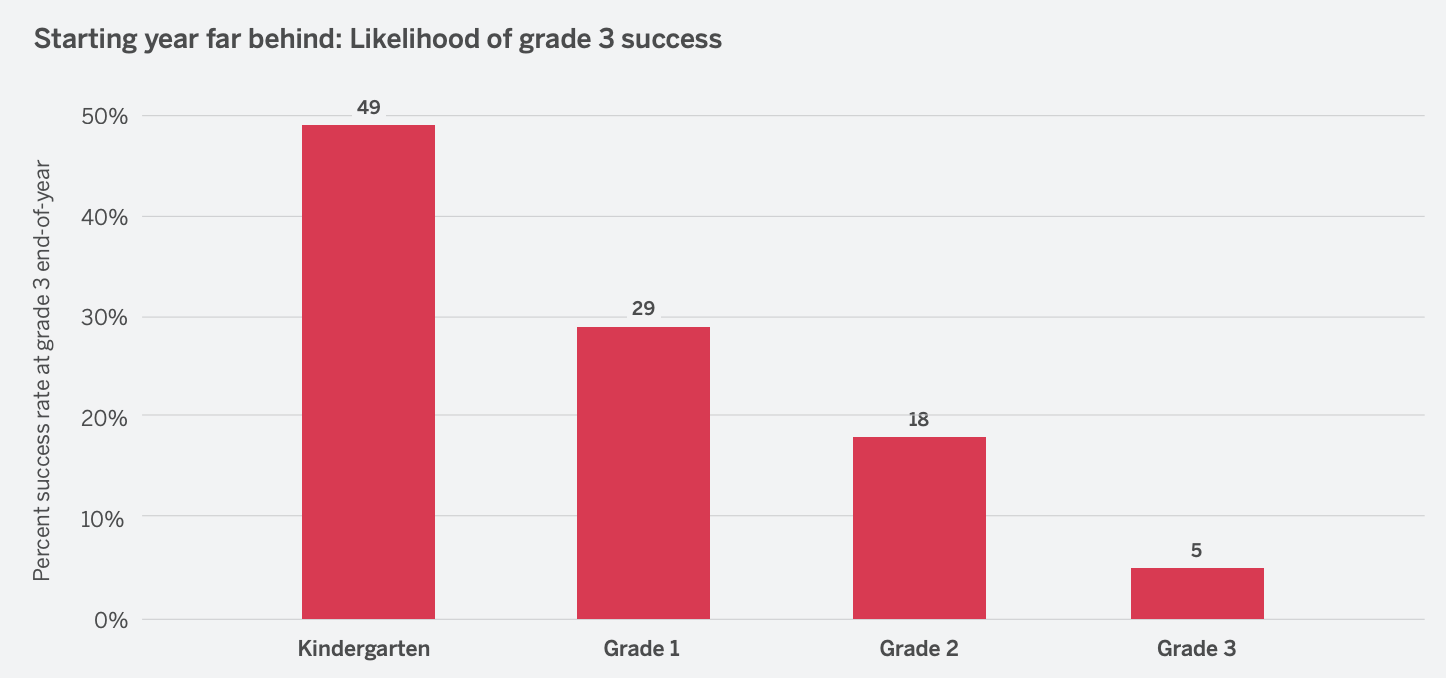Do. Not. Wait.
If your child is behind in the early grades, do not assume they will catch up
This post will be a little different from my normal programming. I sent it out to ReadNotGuess parents but wanted to share it here as well…
If I had one piece of advice for parents, it would be that they should act quickly if they spot any red flags about their child’s reading progress.
This may sound obvious, but schools really aren’t very good at catching kids up. There’s lots of evidence for this, but today I’m going to show you the latest data from Amplify. It’s based on their popular DIBELS early literacy screener.
There are some kernels of good news. Scores are up from the depths of COVID, although they’re still down from where they were prior to the pandemic.
But today I want to focus on the likelihood that a kid will be successful by the end of third grade. The data I’m about to show you comes from approximately 250,000 students in 1,400 schools across 43 states.
As you might imagine, among the kids who started 3rd grade last year who were already on track in reading, 92% of them finished the year performing on grade level. Even among kids who started kindergarten on track four years ago, 87% were still on grade level at the end of third grade. Kids who start on track tend to stay on track.
But what about the kids who are behind? Do they catch up? The graph below has the results. The answer is probably lower than you might imagine, and certainly lower than schools might like to admit.

If you’re having trouble interpreting the graph, let me spell it out for you:
Among kindergartners who started the 2021-22 school year off track, 49% were on track at the end of third grade last year. That’s basically a coin toss.
Among first graders who started the 2022-23 school year behind, just 29% ended third grade on track.
Among second graders who started the 2023-24 school year off track, only 18% completed third grade on track.
Among third graders who started the 2024-25 behind, just 5% were on track by the end of the year.
If your child is behind in the early grades, the odds that they will catch up decline every single year. Do. Not. Wait.
How can you know if your child is off track in reading?
Step 1: Talk with your child’s teacher. In my school district, parent-teacher conferences are happening this month and next. Ask the teacher if your child took a literacy screening test like DIBELS (or see a longer list of popular options here). Ask to see your child’s scores. Be polite, but do not take “no” for an answer.
Step 2: If your child is off track in reading, ask the teacher what the plan is to get them back on track. Trust your gut here and ask for specifics. Small-group tutoring at school, before or afterschool programs, or things to work on at home are all good signs the teacher is taking the challenge seriously. If instead they just try to reassure you that “some kids just need more time,” and they’re hoping to continue as if everything is fine, don’t give up until they outline a more concrete plan.
Step 3: Be on the lookout for any other red flags from your school. If the teacher says your child is reading at a “level C” or something other than a grade-level standard, that’s a sign that your school is using a discredited reading program. To understand why that’s a problem, listen to the “Sold a Story” podcast, starting here.
Step 4: If you get this far, it’s time to take matters into your own hands. Have your child read to you out loud. Find little ways of testing them. Can they read you recipe instructions? Can they pass England’s phonics check? This year, 80% of England’s 6-year-olds were able to pass this test! Can your child?!
Step 5: If you’re still concerned, you can get down to business with reading practice at home. I’m of course biased towards the Read Not Guess programs that I created. They’re free and designed for busy parents. You can sign up for one of the programs, or you can work through the scope and sequence at your own pace.
Finally, it’s not for the casual parent, but the book Teach Your Child to Read in 100 Easy Lessons is a classic for good reason.
But above all else, Do. Not. Wait.



Really important piece. I also think it's important to call out that not ALL interventions accelerate equally! And obviously that acceleration piece is essential if we want to catch kids up.
A lot of our teachers have found incredible success using EBLI and Reading Simplified, which just get kids reading real stuff faster than Orton Gillingham-inspired interventions.
Read about an interventionist who exited nearly students from intervention last year (Title 1 School, many MLLs): https://scienceofreadingclassroom.substack.com/p/accelerating-student-progress-with?utm_source=publication-search
And here's a piece from a 1st grade teacher, who got all of her children reading chapter books by the end of the year (47% started the year at benchmark) :https://scienceofreadingclassroom.substack.com/p/teaching-less-and-learning-more-five
I think we're approaching a place where most people accept that systematic phonics is a standard of care, which means we need to start talking about the differences between different phonics programs and approaches.
I’m my experience as a teacher and a tutor, if a student in elementary school was behind, it takes a year and 2-3 hours per week of intervention with a tutor for one hour. In middle school, it took two years. High school-3 sessions with me per week minimum…this article it so important. Early, in depth intervention is essential!